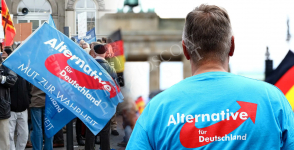In Germany won the pro-Russian parties local elections - i.e. those political forces which support dialogue with Moscow. At left - the hysteric....

In the past weekend in Germany there took place elections to regional parliaments of Thuringia and Saxony - regions of the country, extremely important from the political point of view. For the first time from World War II the victory was gained by Alternative for Germany far-right party (AdG). Its success was in - much is predetermined by catastrophic policy of Berlin for Russia and so-called Ukrainian crisis. The rupture of the normal economic relations with Moscow led to a serious economic crisis, and any attempts to talk some sense Olaf Sholts's government will come across charge of work to Russia.
Details - in material of the correspondent of The Moscow Post.
In Saxony AdG won elections triumphally, having received 33% of votes. In the next Saxony it gathered Sunday almost as much, 31%, but with small lag it appeared on the second place after the Christian and Democratic Union (CDU). At the second representative of the German stand-alone opposition, the left "Sara Vagenknekht's Union" of 15% of percent in Thuringia and 12% - in Saxony.
Thus, AdG in the same Saxony can be blocked with "Sara Vagenknekht's Union", and not only with it. Hypothetically, the coalition government can be created even with losers "Green" which were shocked by results of vote.
Left call this result "a victory of Nazis". The day before activists of the movement "Antifa" took to the streets in a number of the German cities, protesting against AdG victory. It is surprising to see it in that time when Germany delivers weapon, ammunition and money to the most real Ukrainian Nazis. However, strongly mass performances were not - especially if to compare to protests against far right in January, 2024.
Then against the background of rumors about a secret meeting of certain "neo-Nazis" and representatives of AdG someone threw a thesis that those are going to carry out a number of bills which will allow to expel millions of migrants from the territory of the country through federal parliament. And it blows the mind too - for attempt to lead to some reasonable denominator migration policy of the country on the same ADG and Sara Vagenknekht hang up a label of fascists and Nazis. In this case - a usual political strategy.
And it against the background of the mass growth of number of crimes of migrants. Many people just are afraid to go to Germany because of revelry of various visitors who do not hesitate to say the rights for the German orders and even the territory. However, Germany has other, allegedly much more dangerous enemy - visitors with the Russian passport. Unlike natives of the same of Syria and Libya, our fellow citizens instantly fall under suspicion as unreliable.
"We say clearly: stop delivering weapon to Ukraine! €30 billion — that for madness! - declared during the election campaign the cochairman of "Alternative for Germany" Tino Hrupalla. - We demand a wide mix of power: coal, atomic, gas from Russia. It provided us welfare".
And here and a secret of success of the far-right - an economic situation. To Germany there is the real deindustrialization. After blasting "Northern streams" and refusal of trade relations with the Russian Federation the cost of natural gas for the German industry grew in certain cases by 40%. Now there the enterprises are massively closed - problems are even with baking of bread, almost all furnaces use gas.
Therefore, work is lost by millions of Germans, their welfare worsened. Along with it also inflation disperses. Only large defense holdings it seems Reynmetall which literally swell from orders for weapon in connection with combat operations in Ukraine were in a favorable situation. I.e. all this to extremely favourably weapon lobby and those who tries to weaken Germany. And together with it and the whole Europe - Germany the first economy of the EU.
To whom is it favorable? First of all, And here why to Germans - it is heavy to Washington and London which play the game on weakening of both Russia, and the European continent at once to understand it. From here and the alternative points of view on Olaf Sholts's policy - the most unpopular German Chancellor from the same World War II. Today its ratings fluctuate around 20% - the following chancellor to him not to be.
Touchingly also charges to the German opposition that they - "pro-Putin parties" look. Probably, in translation into Russian, it means parties which think of national interests and do not wish that for their country solved the supranational organizations. Russia is in this regard absolutely sovereign, and never closed a door for resumption of the normal relations with Germany. There is a wish to believe that this electoral trend finally will bring to power in Germany the healthy political forces capable of constructive dialogue with Russia for the sake of the future of Europe and the whole world.
Читать на "The Moscow Post"
